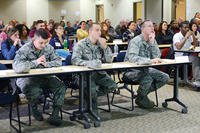Have you been thinking about getting your degree but just haven't gotten around to it yet? Why not?
Procrastination is often caused by one or more factors. These factors, money, time, and fear, are like road blocks keeping you from achieving your full potential. It's time to remove each of these barriers and get started down the road to your success.
Money
Does the cost of a college education keep you from getting started? You may have heard that college money is available, but you don't know where to start looking. In general there are two kinds of financial assistance - direct and indirect.
Direct financial assistance comes in the form of cash or vouchers paid to you or the school. As a servicemember or veteran, you have many sources of direct assistance:
Tuition Assistance programs are available to eligible members of the Army, Navy, Marines, Air Force, Coast Guard and Ready Reserve. Each service can pay up to $4,500 per year for 100 percent of tuition expenses.
Each service has its own obligated service requirements, criteria for eligibility, application processes and restrictions. Monies are usually paid directly to the institution by the individual services. Additionally, active-duty members may elect to use the GI Bill "top-up" in addition to Tuition Assistance to cover high-cost courses.
VA education programs like the Post 9/11 GI Bill are available to help servicemembers and veterans reach their education goals. These programs offer generous education benefits to help pay for college, technical, or vocational courses. This includes distance learning, correspondence courses; certification tests; apprenticeship/job training; and flight training.
Federal Student Aid (FSA) programs offer low interest loans and grants (free money). Like the the GI Bill, federal student aid is designed to assist you in meeting the cost of tuition, books, fees and living expenses while attending school. Unlike the GI Bill it doesn't necessarily pay the full tuition, the tuition remaining after Federal Student Aid is paid must be covered by you. It does not matter whether you are active duty, reserve, veteran, retiree, using the GI Bill or not - you should be taking advantage of these programs wherever possible.
Once you have enrolled in college, you need to start the aid application process. You can apply for all available federal student aid programs by filling out the U.S. Department of Education's Free Application for Federal Student Aid (FASFA) form online at www.fafsa.ed.gov. Once you have submitted the form, your school will notify you about the loans and grants - and the total amounts - you are qualified to receive. When you get this notification from the school, select the loans and grants you want and the school will finish the loan process.
Indirect financial assistance is available to servicemembers and veterans in several forms. You can avoid paying for college credit by applying your military experience and training, and by taking credit-by-exam tests.
Academic credit for military experience and training may be obtained through a recommendation from the American Council on Education (ACE). ACE evaluates hundreds of military courses, schools, AFSCs, MOSs and ratings each year. Each ACE evaluation includes a curriculum description, course length, dates and recommended credits listed for both upper (bachelor's) and lower (associate's) levels. Thousands of accredited schools throughout the country accept ACE recommendations for academic credit.
Note: Not all schools grant ACE recommended credit for military experience, so it is vital that you shop around for the school that works best for you.
Credit-by-exam provides the opportunity to earn college-level credits through a program of exams. More than 2,900 colleges grant credit for CLEP (College Level Examination Program), DSST (DANTES Subject Standardized Tests) and ECE (Excelsior College Exam) tests. Choose the subject test and study media you prefer (videos, textbooks, study guides), determine when you're ready, and contact your Education Services Office to order the test and set a date.
The average college course can cost up to $250 per credit or more, so credit-by-exam can help you save money. Additionally, DANTES (Defense Activity for Non-Traditional Education Support) offers its credit-by-exam tests for free to active and reserve military members.
By applying your ACE credits and CLEP tests, you may already have earned enough credits to obtain an associate degree without ever stepping into a college classroom or lecture hall, saving yourself money and time.
Time
Does it seem that you barely have enough time to get anything done? Is the thought of adding school to your schedule overwhelming? You aren't alone, but if you don't have time now, when will you?
If you're waiting to get started when you leave the service, you're missing a golden opportunity to get a jump on your education. You will probably never work for a more education-friendly organization than the U.S. military!
Online courses follow the same format as traditional college courses, with a professor, textbooks, homework, exams, etc. However, online courses have a higher degree of flexibility and usually use a combination of message boards, e-mail, chat rooms, CD-ROMs and textbooks. Online courses typically maintain weekly deadlines; however, your study schedule is completely up to you.
DANTES offers catalogs that list thousands of distance learning courses from hundreds of well-known schools. These courses are self-paced, offer a great deal of flexibility and usually issue generous deadlines for taking the exams. You typically watch videotaped courses, take notes, and use the study guides at your own pace - and you take exams when you are ready.
The costs of these distance learning courses are usually covered by Tuition Assistance or your MGIB.
Fear
Fear is not an unusual reaction when taking on a new challenge. The thought of taking on any large commitment, such as achieving your educational goals, can prove intimidating. However, the military and VA have created programs to help you deal with this challenge.
Veterans Upward Bound and Tutorial Assistance programs are available to both military servicemembers and veterans alike. If you are a veteran, you should contact a VA representative for assistance. Active-duty and reserve component members, you should speak to your local Education Service Office or Navy College representative about programs that can help you brush-up on your study skills.
A college degree is less a measure of intelligence and more a measure of commitment and tenacity. By rising to the incredible physical and mental challenges of a military career, you have already proven you have what it takes to successfully reach your education goals.
Instead of letting fear stop you, let it motivate you! Here's what you really should fear: lower wages, unemployment, and missed promotion and advancement opportunities.
If you finally decide that you are ready to increase your earning potential, get that promotion and use the benefits you have earned before it is too late, then you have decided to turn fear into motivation.
Now it's up to you to stop procrastinating and start achieving your full potential!















